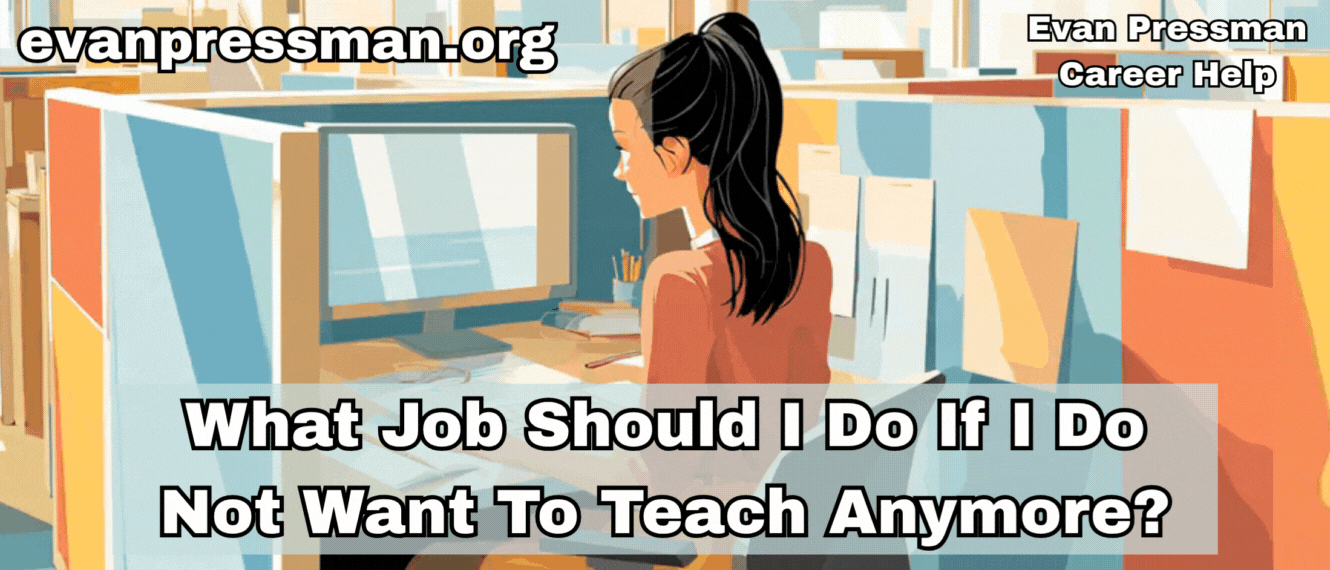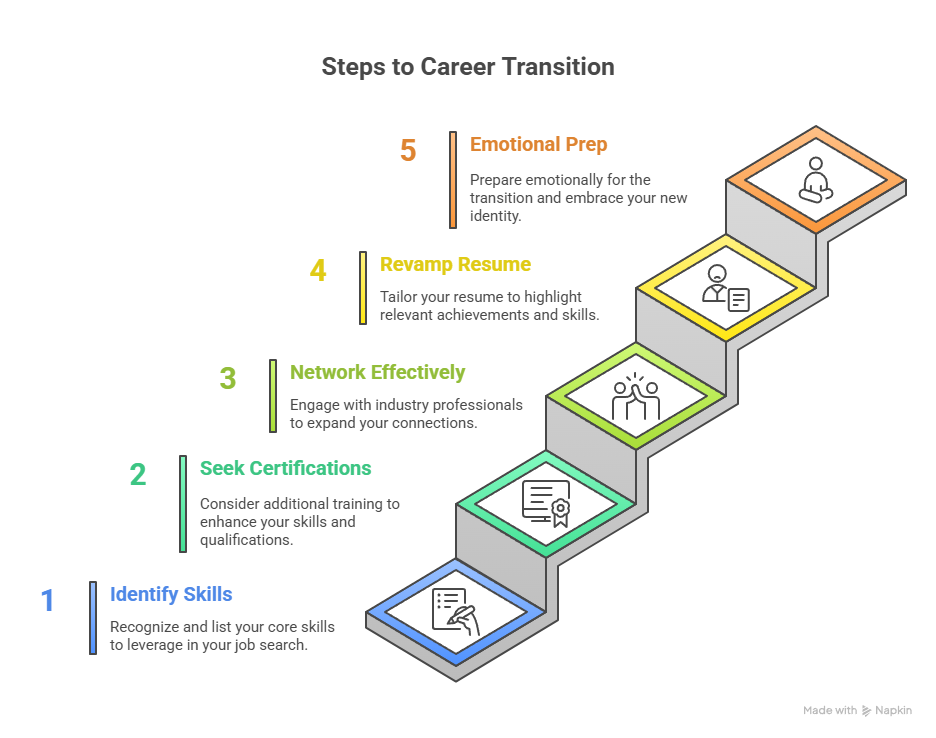What Job Should I Do If I Do Not Want To Teach Anymore?
Do You REALLY Want to Do This Forever?
You’re tired. The lesson plans, the constant grading, and the shifting expectations are enough to make even the most dedicated teacher wonder, “Is this what I want to do for the rest of my life?” If you’ve been thinking about life outside the classroom, you are not alone.
Every year, plenty of teachers start asking the same question: What’s next? Whether you feel burned out, ready for a change, or simply want to grow in a new direction, it is completely normal to feel uncertain about what comes next.
Here is the good news. Your teaching career has not trapped you. In fact, it has given you valuable skills that can open doors to many careers you may not have considered. This guide will walk you through realistic career paths where your strengths can shine without requiring you to start over.
Inside, you will find:
Careers where former teachers often thrive
Specific job examples and what they involve
Practical advice for making the switch
Trusted resources to help you take the next step
Ready? Let’s explore what is waiting for you beyond the classroom.
The Skills You Already Have (And Why They Matter)
Before we get into specific job options, here is something important to keep in mind. You already have valuable skills. The abilities you have developed as a teacher are not just useful; they are in demand in many industries.
Here’s what you bring to the table:
Communication: Whether you are presenting lessons, talking with parents, or navigating difficult conversations, you know how to explain ideas clearly and connect with others.
Leadership: You have led classrooms, organized projects, and motivated students. That is real leadership experience.
Organization: From lesson planning to grading and managing schedules, you are used to handling deadlines and keeping things on track.
Adaptability: No two days in teaching are the same. You have learned how to think quickly and solve problems on the spot.
Curriculum Design and Training: Creating engaging lessons is a form of curriculum development, and many industries need people with this skill.
Career Paths for Former Teachers (With Examples & Roles)
1. Corporate & Business Roles
Many teachers find success in business roles, especially in jobs that involve training and working with others.
Corporate Trainer: Lead workshops, onboarding sessions, and professional development programs for employees. This role feels similar to teaching but in a different setting.
HR Specialist: Help recruit new employees, assist with staff support, and handle workplace issues. Your strong communication and problem-solving skills are valuable here.
Learning and Development Specialist: Design and deliver training programs for employees, combining your passion for teaching with business needs.
Key Skills: Training, leadership, people skills
2. Education-Adjacent Careers
If you still care about education but want a change, these jobs allow you to stay connected to learning without being in the classroom.
Instructional Designer: Create online courses, training programs, or learning materials for companies or educational platforms.
Educational Consultant: Advise schools or organizations on curriculum design, technology integration, and more, often working independently.
Curriculum Developer: Design and improve educational resources for publishers, nonprofits, or school districts.
Key Skills: Curriculum development, instructional strategy, consulting
3. Nonprofit & Community Roles
If making a difference continues to be your priority, nonprofit work may be a great fit.
Program Manager: Oversee education-focused programs, handling budgeting, staff coordination, and operations.
Community Outreach Specialist: Build relationships with local organizations, coordinate events, and lead educational initiatives in the community.
Key Skills: Program management, community engagement
4. Publishing & Media Opportunities
If you love writing and content creation, publishing offers plenty of opportunities.
Educational Content Developer: Write or edit textbooks, learning tools, or digital resources for publishers and edtech companies.
Editor or Writer: Apply your writing and editing skills in journalism, publishing, or freelance work. This is a great fit for former English teachers.
Key Skills: Writing, editing, subject expertise
5. Government & Policy Positions
If you are interested in shaping education at a larger level, consider working in government or policy roles.
Education Policy Analyst: Research education policies and recommend changes for government agencies or nonprofit groups.
Program Coordinator: Oversee government-run education programs to ensure they run effectively and achieve positive results.
Key Skills: Research, policy work, program coordination
6. Library & Information Science
If you enjoy research and organization, this field might interest you.
Librarian or Library Media Specialist: Manage information resources, assist with research, and promote literacy in schools, universities, or public libraries. Many of these jobs require a master’s degree, but your teaching background will serve you well.
Key Skills: Research, organization, literacy
7. Tech & EdTech Careers
If you enjoy technology, the growing edtech industry offers plenty of possibilities.
Education Technology Specialist: Help schools and companies implement and manage learning technologies.
Product Manager or Customer Success Manager (EdTech): Use your classroom knowledge to improve education products or support clients. These jobs are great for people who enjoy solving problems.
Key Skills: Tech adoption, product feedback, customer support
8. Other Creative Options
If flexibility is important to you, these careers can offer more independence.
Sales Representative (Educational Products): Sell textbooks, learning tools, or education technology to schools and districts.
Freelance Coach or Tutor: Offer tutoring or coaching services independently or through online platforms.
Online ESL Teacher: Teach English to students worldwide with flexible hours and fewer administrative tasks.
Key Skills: Subject expertise, independence, communication
Making the Transition: Practical Steps
Switching careers can feel overwhelming, but with a clear plan, it becomes more manageable.
Identify & Map Your Transferable Skills
List the core skills you use every day, such as communication, project management, and technology. These are your greatest strengths in your job search.
Consider Additional Certifications or Training (If Needed)
Some fields, such as instructional design or HR, may require certifications or short courses. Think of this as an opportunity to refine your skills, not as starting over.
Networking Tips for Career Shifts
Networking is key.
Join LinkedIn groups focused on your target industry
Attend online meetups or conferences
Reach out for informational interviews with people already working in the field
Resume Revamp: Translate “Teacher” to “Professional Candidate”
Avoid education-specific jargon and focus on results.
Highlight accomplishments such as “Improved student engagement by 30 percent.”
Showcase leadership and project experience.
Tailor your resume for each job, aligning your skills with the job description.
Emotional Prep: Embracing a New Identity Outside Teaching
It is completely normal to feel excitement and uncertainty at the same time. Give yourself time to adjust. Remember, you are not leaving your sense of purpose behind… You are simply taking it in a new direction.
Resources for Further Exploration
If you want to explore further, these resources can help:
All Education Schools: What Can I Do With a Teaching Degree (Besides Teach)?
A detailed guide for educators seeking new career paths.Indeed: 21 Alternative Jobs for Teachers
A practical list of jobs with salary information and career advice for teachers.EducationDegree.com: Best Jobs for Teachers Who Don’t Want to Teach
Detailed job profiles with education requirements and salary details.University of San Diego: Alternative Careers for Teachers
Practical guidance from a respected university on career transitions for teachers.CareerVillage: Keywords and Careers for Teachers Switching Careers
An interactive platform where career changers share advice and ask questions.Devlin Peck: 50 Best Jobs for Former Teachers
A great resource for anyone interested in instructional design or online education careers.
Closing Thoughts
Your time as a teacher was not wasted. It provided the foundation for what comes next. Every lesson you taught, every challenge you faced, and every connection you built has prepared you for this moment.
There is a meaningful life after teaching. It may look different, but it can be just as rewarding, if not more so.
Leaving the classroom is not the end. It is simply the beginning of a new chapter, filled with opportunities waiting for you.
Frequently Asked Questions (FAQ)
1. What are the best jobs for former teachers who still want to help others?
Roles such as Corporate Trainer, Educational Consultant, Program Manager, or Community Outreach Specialist allow you to continue making an impact, just in a different setting.
2. Do I need additional certifications to switch careers?
Not always. Many fields, including corporate training or curriculum development, do not require extra credentials. However, fields such as instructional design, HR, or library science may require some additional training.
3. How do I explain my teaching experience on a resume for a non-teaching job?
Focus on transferable skills like communication, leadership, and project management. Use clear, results-focused language and tailor your resume for each job you pursue.
4. What’s the most flexible career option for former teachers?
Freelance tutoring, online ESL teaching, and educational content development offer flexible hours and remote work options, making them great choices for those who want more control over their schedule.
5. Where can I find more resources for changing careers after teaching?
Check out the resource links listed in this post. They offer job options, salary comparisons, and step-by-step career advice.
Ready to Rework Your Resume?
🎯 Click here to get professional help that will help you go from 0 interviews to dream job in no time — let’s make your amazing experience sound like the powerhouse it is.



